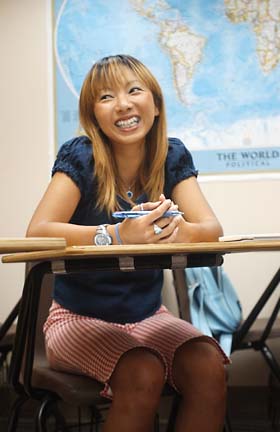
ASSOCIATED PRESS
Sitting in her English class at Central Pacific College in Honolulu is Misa Katayama, 25, of Yokohama, Japan. Unlike Katayama, hundreds of other students have canceled their student travel and study trips this year, citing health or security concerns.
Foreign students
fear travelSchools specializing in English
instruction see enrollment drop
Misa Katayama flew from Japan to Hawaii to study English wearing her mother's going-away gift: a protective mask to guard against the SARS virus.
But at least she's making the trip.
Fears of travel have not only hurt Hawaii's traditional tourism industry, but also a pool of the state's private schools and public programs that teach English to non-native speakers.
Hundreds of students who come to Hawaii to learn English have canceled their trips this year, citing health or security concerns, according to schools and educators with foreign clients. Some schools that teach English as a second language have seen enrollment drop as much as 50 percent from last year.
Students are "worried about the world situation," said Marta Wiggins, director of the Institute of Intensive English in Honolulu. "We've been reeling."
Katayama, a 25-year-old travel agent from Yokohama, Japan, who is studying at Central Pacific College in Honolulu, considered canceling her study trip but decided to come because her payment was nonrefundable.
"They're concerned about whether it's safe for them to study," said Wiggins, whose school is one of about 30 English-language programs on Oahu and about 10 others around the state. Many of them, still dealing with the effects of Sept. 11, 2001, on travel, are now grappling with the SARS epidemic, stricter visa rules for incoming students and other effects of terrorism and the war in Iraq.
The allure of the islands, coupled with Hawaii's proximity to Asia, prompted the growth of a private English-teaching industry that brings about $20 million to Hawaii each year in tuition alone, said David Hadway, director of operations at Central Pacific. Most students who come to the islands to study English hail from Japan, Korea and China.
There are no statewide statistics on a decline in revenues at Hawaii's English schools, and the Immigration and Naturalization Service does not specifically track the number of students who come here for language instruction.
But evidence shows there has been a downturn, one that parallels a tourism slump from Japan and the rest of Asia that began with the 9/11 terrorist attacks.
Gov. Linda Lingle arrived in Tokyo yesterday on a mission to reassure the Japanese that it is safe to come back to the islands for pleasure, business and schooling. Japanese arrivals to Hawaii have dropped about 30 percent from last year.
Hadway said that some students who were able to cancel their trips to Hawaii without penalty probably switched to schools in Australia or New Zealand. Others may have opted to learn English in their home countries.
The University of Hawaii, which runs a program for English as a second language, has only 112 students in 14 groups this year, down from last year's 250 students. In 2001 the university enrolled 599 students in 21 groups.
"Some schools are scrambling to stay in business," said Judy Ensing, director of the English as a second language programs at the University of Hawaii's Outreach College.
Sharon Sing, coordinator for Hawaii Homestay, which places students studying English with local families, said the program placed 12 groups last year, with up to 40 students in each group. She said only five groups have signed up this year, with the number of individual students down by 50 percent since last year, she said.
Jennifer Wharton, chapter president of Hawaii's Teachers of English to Speakers of Other Languages, said many parents have expressed concerns about sending their children to study in the United States.
When the war in Iraq began, Transpacific Hawaii College, where Wharton is an instructor, was flooded by calls from parents asking about the possibility of terrorist strikes in Hawaii.
"They were nervous," she said. "We explained what was being done to keep their children safe."
